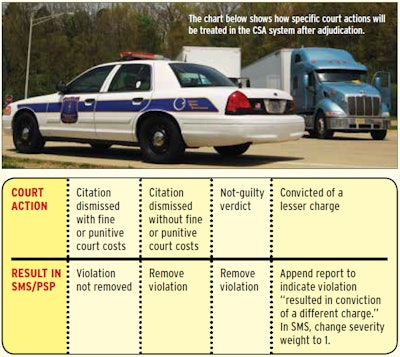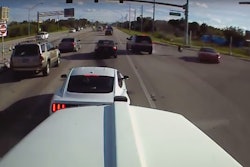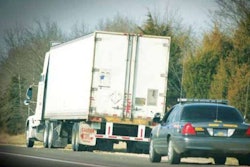For the previous installment in this feature series, follow this link.
While prospective employers/lessors aren’t strictly required to use the Federal Motor Carrier Safety Administration’s Pre-Employment Screening Program to view prospective drivers’ roadside inspection violations and recordable crashes, it’s no secret that plenty of them do in the post-Compliance, Safety, Accountability era. Any violation marked on an inspection report will be included there going back three years, and any crash, five years.
Fortunately, two years ago, the FMCSA changed its policy relative to violations associated with citations that were adjudicated in a court of law. The associated violation will remain on your PSP record and your carrier’s CSA Safety Measurement System profile – for independents with their authority, on both – as court proceedings are in progress. But if the court reduces the charge or throws out the violation, it’s the responsibility of you or your carrier to use the DataQs system to provide FMCSA with a copy of the court ruling to remove the violation or reduce its severity weighting in the system.
 This chart shows the various court actions and how those are treated in the CSA SMS after adjudication.
This chart shows the various court actions and how those are treated in the CSA SMS after adjudication.The services offered by Drivers Legal Plan and the Klepper law firm include handling the DataQs process for driver clients after any successful court proceeding, as do some other legal service providers. Brad Klepper reports a roughly 94-95 percent rate on its legal cases in generating a favorable effect for the driver, whether dismissal, a not-guilty verdict or reduction to a lesser charge. In all such cases, the DataQs process becomes fairly straightforward, given FMCSA’s policy change.

But in the case of a violation without a citation and no day in court for the driver/carrier, it’s a more uphill battle. “You make the best argument you can with the case you’ve got and the facts you have,” Klepper says.
For drivers navigating those murky waters, evidence is key. For log book violations, it helps to prove the log’s accuracy by providing receipts or other documents stamped with times and places that match up.
Equipment violations? “Photographs are a beautiful thing,” Klepper says, particularly “if you can date-/time-stamp it” at the time of the violation. An affidavit from a mechanic could help disprove the officer’s judgment. “Say a mechanic says, ‘No, you don’t need to replace that chafing hose.’ All of those types of things we can use in support of the case.”
Contesting crashes assigned to you today isn’t possible unless a crash is wrongly assigned to your DOT number or CDL, though that also could change as FMCSA explores ways to account for fault or preventability in CSA.
If you’re navigating the DataQs system yourself, you can create a profile to use the system and get a feel for it via dataqs.fmcsa.dot.gov. For a primer on various aspects of making a successful challenge to a violation, review this “How to DataQ” story in Overdrive.
Your PSP record can be purchased for $10 periodically to keep tabs on what’s shown there via psp.fmcsa.dot.gov. To obtain a free copy, you can make a Privacy Act/FOIA request through DOT, though the process takes weeks.
If you’re independent with your authority, all violations will be shown within your freely accessible CSA SMS profile.
Next:











